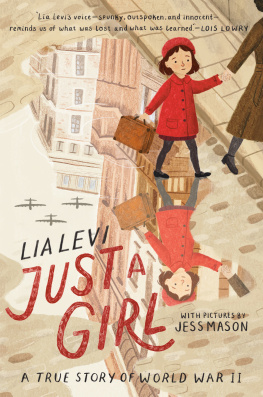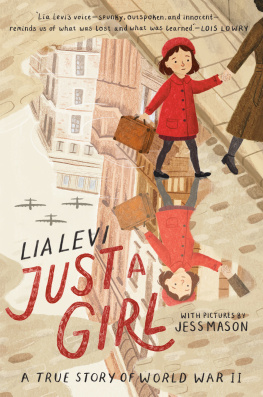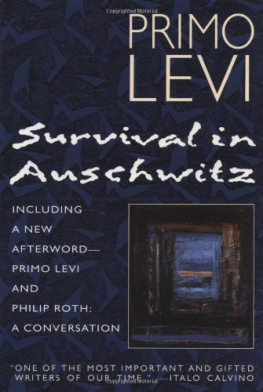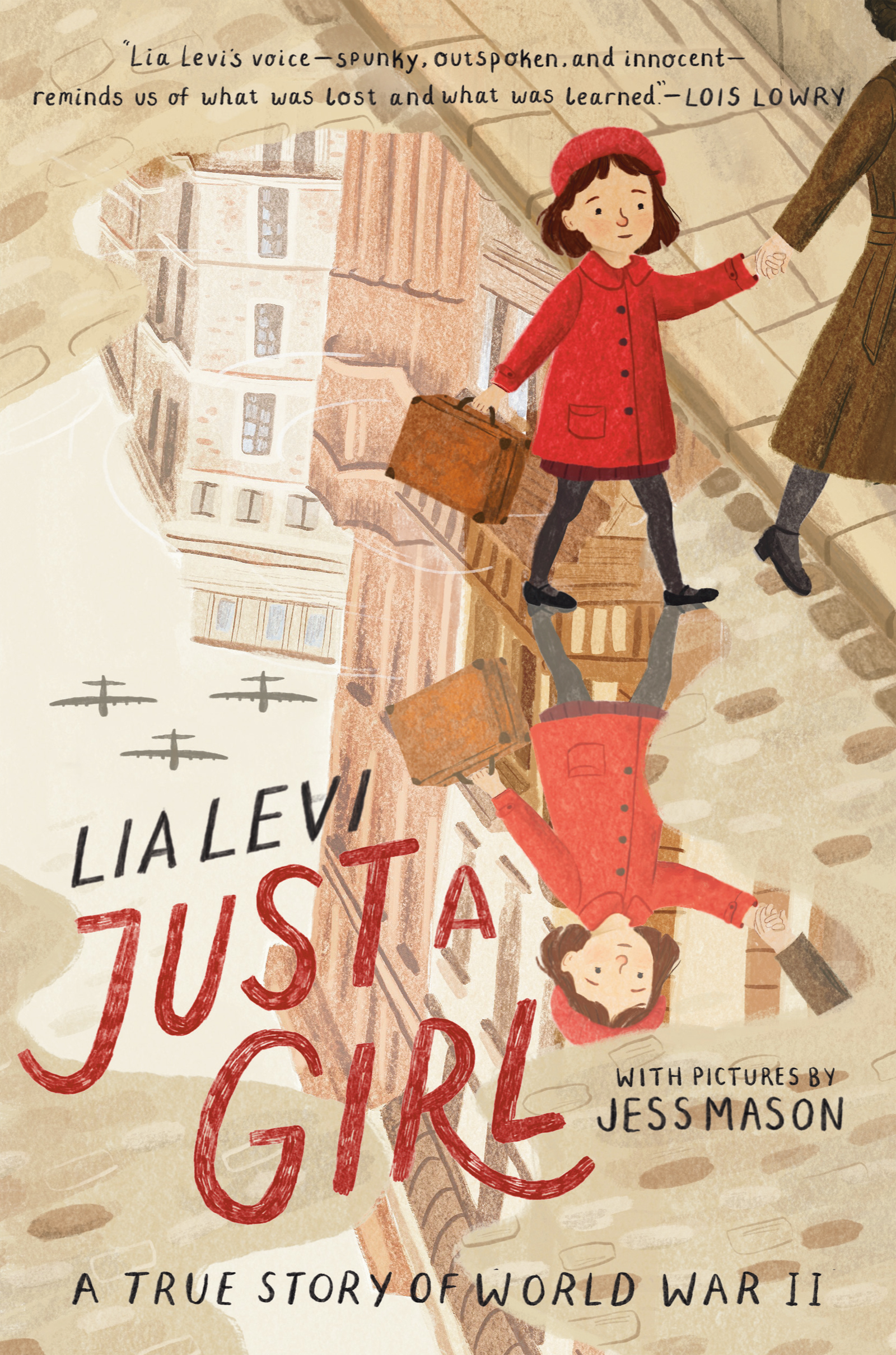Contents
M y name is Lia (if you look at the cover of this book, youll find my name on it!) and I want to tell you the story of when I was a little girl. Mama, Papa, my two younger sisters, Gabriella and Vera, and I lived in a city in Italy called Turin.

Turin has a river and a park and lots of piazzas, which are like big town squares, but not the sea. It doesnt have the sea.
So when summer came, we would pack our bathing suits and our shovels and pails in our suitcases and take the train out to a tiny village with colored houses, sand, beach umbrellas, and small blue waves you could wade into even if you didnt know how to swim.
Thats why my story starts with a newspaper stand right on the beach and my parents telling six-year-old Lia, Today, youre going to buy the newspaper.
As I said, the stand is right at the end of the beach, which means you dont have to cross the road to get there. It is not dangerous for children.
Hmm. Why are they telling me to go buy a newspaper right now?
I think about it for a while. Then I understand.
I just finished first grade, but it is as if I never set foot in my classroom. As if I didnt even sit at those ugly desks, doing what everyone else did.
The reason is easy to explain. I was terribly (terribly!) shy, and at school I couldnt get one single sound to come out of my mouth.
Do you know what a baby bird sounds like? Peep... peep... peep? That was my voice. No one could hear it.
During my first days, the teacher listened extra hard, trying to understand what I was saying, but soon she got bored, preferring to just let the other children speak.
So when my parents send me to buy the newspaper, this is what they want: they want to make me do things that will force me to talk to other people!
So now Im standing in front of the newsstand holding tightly to a coin.
Sir, sir! I think Im shouting to the big man behind the counter.
But all thats coming out is probably the usual peep... peep... peep. And he isnt turning around.
How can I possibly get a newspaper? If Im still holding this coin when I get back to my parents on the beach, they are going to be very unhappy.
Thats when I make a very smart decision. I reach up and place the coin on the counter and take the newspaper myself.

Here it is! I yell, waving the newspaper. (When Im with my parents I do have a voice.)
Papa happily takes it, but then asks, Wheres the change?
The man didnt give me any, I whimper. Which is actually the truth.
This story does not end well.
The three of usme, Papa, and Mamahead to the newsstand, where the man says he didnt see any money and tells us to pay for the newspaper I took.
Its a lie, but Papa pays anyway because he doesnt like to argue.
T he next day Mama tells me she wants to have a talk with me.
Oy vey! She wants to talk about the newspaper again, I think, annoyed.
But its not that. Mama makes me sit down and tells me in a very serious tone of voice, You wont be able to go back to school this year.
Why is she making such a sad face? Im so happy! I can go right ahead talking in my peep peep peep voice, and there wont be anyone around to get angry.
But Im afraid this will upset my mama, so I ask, Why cant I go anymore?
Mussolini doesnt want Jewish children in Italian schools, she says.
Thats silly! Who would ever believe something so ridiculous?
I know perfectly well that being Jewish means:
1. Going to synagogue some Saturdays (every Saturday would be too much).
2. Lighting two candles on Friday evenings (but Mama takes care of that) and one each night for Hanukkah (which also means getting gifts).

3. Fasting for a day once a yearthat is, eating nothing (but this doesnt apply to children).
4. Not eating bread for eight days at Passover, only a special, flat, hard kind of bread called matzo. (But once when I was at my friends house I forgot about it and devoured a roll with butter and jam.)

And theres another thing I know too.
Mussolini is our leader. He is in charge of everybody. And in class, in the songs and poems that we recite all together, we call him Duce! Duce!
So why would our leader even care if certain Jewish children (only certain ones) are not doing very well in school just because they are extra shy?
I really think Mama is confused, so I run to Papa.
I explain all these things Ive been thinking about, but he doesnt smile at all. Actually, his face is even more serious than Mamas.
Remember when you broke the blue glass vase and then said it was your sister Vera whod knocked it over?
What does that vase have to do with this? Now I sit up straight in my chair and turn red. I was sure hed believed me that day.
You behaved that way, Papa continues very calmly, because your sister was small and still couldnt speak very well, so she couldnt defend herself. And because you knew that we would never have been angry with her.
Help! This is all I need after what happened with the newspaper!
But, luckily, it seems Papa isnt planning to scold me.

I want you to understand that sometimes blaming someone else is also a way of keeping people quiet. For example, are there some things that dont work very well in a country? Sure! So the leaders of the country find people who are different from themmaybe because they believe in another religionand they say, Its their fault! Theyre our enemies. People believe them, and theyre even happy because then they know who to be angry with.
I stay quiet for a long time. Papas words are hard to understand. I need to think them over. Then I say to him, Are you saying that Mussolini is doing this with the Jews?
Papa nods. Thats when I shout, Thats a horrible thing to do! Ill never chant Duce! Duce! again!
I am sure Papa will like my answer, but he doesnt. He even seems angry. He grabs me by the shoulders, or maybe hes just hugging me.
Listen carefully, he tells me. The Duce decides everything by himself, and everyone else has to say yes to him. Anyone who speaks out against him ends up in prison.
I must look really scared, because my papa quickly adds, Not children, but they might arrest their parents.
How does that keep a child from worrying?
Papa must guess what Im thinking because he starts being funny and patting me on the shoulder, and we laugh a little bit.
Promise me just one thing, he says. Never tell anyone what Ive just explained to you.
Do I even have to promise that?
Everyone knows my voice: peep... peep... peep...
Nothing happens for the next two days. Luckily, nobody wants to talk to me.
















